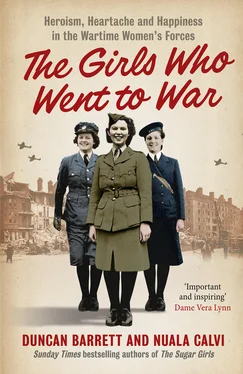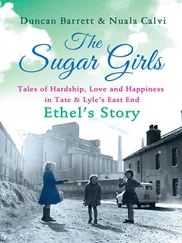In fact, it was rare to hear Mr Ward raise his voice at all, other than where Germans were concerned. He was a kindly man, whose health had never been the same since he had returned from the trenches 20 years earlier. It didn’t help that he had to work six days a week, hammering away in his little cobbler’s shop – and keeping it open until 9 p.m. most nights for the sake of the local farm labourers. Most of his customers only had one pair of dilapidated old boots to their name, but Mr Ward would work miracles on them, knowing that their owners couldn’t afford to buy new ones.
While Jessie’s father was out working all hours, his wife had free rein to boss their only daughter around. Fanny Ward was small, pretty woman, but her demure exterior belied a sharp temper, and Jessie had learned from a young age never to displease her. Every time she dropped a ball of wool she was winding or accidentally broke a cup in the kitchen, she was bound to get a clout round the ear.
Whenever she could, Jessie escaped to her grandmother’s house to play on their beaten-up old piano. She had inherited a talent for music from her father’s side of the family, and when she sat and played her cares seemed to melt away, the music transporting her to a realm of pure joy. Mr Ward was proud of his daughter’s musical talent, and put aside a shilling a week to pay for her to have lessons.
The only thing that came close to playing, as far as Jessie was concerned, was dancing. As she grew older, she and her best friend Joan started attending the dances that were held every week at the little church hall in Holbeach Bank. She knew she was a good dancer, and she enjoyed showing off her skills, but her mother made sure that her confidence never went to her head. ‘Do I look all right, Mum?’ Jessie asked her one night, as she was about to head out. ‘You’ll do,’ Mrs Ward replied. ‘But who’s going to be looking at you , anyway?’
When Jessie left school her piano playing proved a useful source of income, as she began giving lessons to the village children. But most of her time was still dictated by her mother, who kept her busy helping with knitting for the local wool shop, doing the gardening, cleaning the house, cooking and running errands.
There wasn’t much to look forward to in Holbeach Bank, beyond one day marrying a boy from the village and moving out – and to begin with, the advent of war didn’t make much difference to the sleepy community. Most of the local lads were farm labourers, so they were exempt from conscription, and the village was so tiny that no one thought it worth installing air-raid shelters.
But for Jessie’s father, the new war brought with it a new sense of purpose. He was thrilled when he heard on the wireless that men up to 65 were needed to help defend their country, as part of the Local Defence Volunteers or ‘Home Guard’. Now Mr Ward spent his spare time back in uniform, practising his marching and going out on night patrols, armed with an old First World War rifle. Wherever he went, he walked about with his chin up and his back straight as a rod. The neighbours joked that if you cut him, his blood would be khaki.
But Jessie’s father’s new pastime meant that she was left alone in the house with her mother more than ever, and she began to grow desperate for something that would take her away. One day, she spotted an advert for a waitress at a little truckers’ cafe on the road to Holbeach proper. It was hardly glamorous, more of a ‘greasy spoon’, but Jessie jumped at the chance to get out of the house, hurrying to the cafe and offering her services.
‘Are you sure you want the job?’ asked the woman who ran it, looking at the slip of a girl in front of her. ‘We get some pretty tough types in here, you know.’
‘Oh, that doesn’t bother me,’ Jessie replied. If she could put up with her mother, she was sure she could handle a few truckers. The other woman didn’t look quite convinced, so Jessie suggested helpfully, ‘If you like, you can serve the posh customers, and I’ll look after the tough guys.’
‘You’re on,’ said the woman, hastily handing Jessie an apron as a group of burly-looking men came in through the door.
On the evenings when Mr Ward was at home, the family always gathered to listen to the BBC’s 9 p.m. bulletin and hear the latest news of the war. In May 1940 they all sat in shock as they heard that the British Expeditionary Force was being evacuated from Dunkirk. An armada of fishing boats, crabbers, trawlers, shrimpers and yachts had answered the call for assistance, bringing back hundreds of thousands of exhausted soldiers while the Luftwaffe pounded them from overhead.
The new Prime Minister, Winston Churchill, told the country that the evacuation was a ‘miracle of deliverance’, but Mr Ward wasn’t so easily convinced. ‘We ran away from those Jerrys with our tails between our legs,’ he said, shaking his head sadly.
Back on home soil, the effects of the evacuation were soon felt around Holbeach, as the battered British Army regrouped and replenished itself. Soon soldiers started to be seen around the village, and a nearby stately home called Bleak House was requisitioned by a Royal Artillery regiment.
Jessie knew the house well, since her friend Joan was the niece of the caretakers there, Mr and Mrs Hedqvist, who encouraged Jessie to come and play the grand piano in the drawing room whenever she liked. ‘We don’t see much of the soldiers really,’ Mrs Hedqvist told her when she turned up to practise one day. ‘They’re mainly just using the kitchens and the dining room for their officers’ mess.’
As Jessie approached the magnificent piano, Mrs Hedqvist sat down on a chair and took some knitting out of a little bag. She often liked to knit while Jessie played, and the regular klick-klacking was almost as good as a metronome.
Jessie began to run through a few scales. Then, when she felt she was properly warmed up, she moved on to a piece she had recently learned, a nocturne by Chopin in G minor. She was pleased to find that she could get through the whole thing without the sheet music – and even more pleased, when she reached the final notes, to hear applause echoing around the drawing room.
Jessie looked over to Mrs Hedqvist, but the caretaker was still busy with her knitting. Then she turned and looked behind her, where she discovered the source of the clapping. A young soldier was standing by the doorway, clearly enraptured by the music. ‘That was wonderful,’ he exclaimed, beaming at Jessie enthusiastically.
‘Oh – hello!’ Jessie replied, her cheeks flushing red. ‘I’m glad you liked it.’ The soldier was a couple of years older than her, with dark hair and a beautiful smile, and Jessie found him very attractive.
The young man approached the piano. ‘I don’t suppose you take requests?’ he asked her.
‘Well, what do you like?’ Jessie said. ‘If I don’t know it, you can always hum the tune and I’ll try to pick it out.’
‘How about “There’ll Always Be an England”?’
‘Oh, that’s easy,’ Jessie told him, launching into the popular tune. But what seemed easy to Jessie obviously impressed the young soldier. As she played, she looked up now and then, and every time she saw him grinning from ear to ear, clearly enchanted by her performance.
Jessie had come to Bleak House intending to practise her classical pieces, but that afternoon she found herself playing a host of popular tunes instead as the young man requested one song after another. Soon they were both so lost in the music that they had completely lost track of time, and it was only when a grandfather clock in the corner of the room began to chime that the young man suddenly came to his senses. ‘Oh my goodness,’ he said. ‘I’m supposed to be on duty!’
Читать дальше












